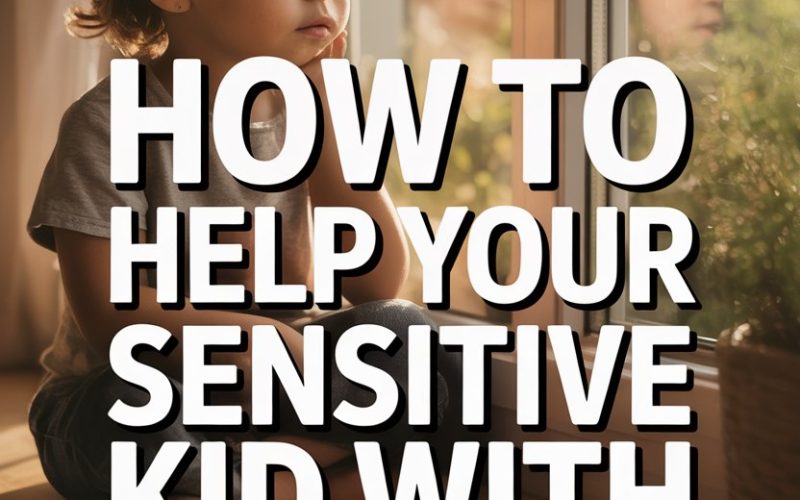Parenting a sensitive child with anxiety can feel a bit like trying to keep a soufflé from collapsing during a marching band rehearsal.
The world is noisy, unpredictable, and sometimes your child’s emotions seem bigger than the universe.
You want to help, but you’re also running on cold coffee and last night’s leftovers.
Here’s a survival guide for busy parents who want to support their anxious kid—without losing their sanity or their sense of humour.
Recognising Anxiety in Sensitive Kids
Anxiety in children wears many disguises.
Some kids become mini-lawyers, negotiating their way out of social situations with more skill than a seasoned barrister. Others turn into shadows, clinging to your leg like a barnacle every time you leave the room.
Sometimes anxiety shows up as tears, tummy aches, or epic meltdowns over seemingly minor stuff (like the wrong brand of yoghurt).
It’s tempting to brush these concerns aside—after all, every child worries now and then—but sensitive kids often experience anxiety more deeply.
Their nervous systems are wired a bit differently: they notice more, feel more, and occasionally turn molehills into Everest-sized mountains.
Their anxiety isn’t about drama. It’s real, and it’s exhausting, especially for them.
Why Sensitive Kids Are Wired for Anxiety
Science has a few things to say here. Researchers have found that sensitive kids often have heightened reactivity in their amygdala—the brain’s “alarm system.”
They process stimuli more intensely, which means that what feels like a harmless joke or a slightly raised eyebrow to you can feel like an emotional earthquake to them.
Elaine Aron’s research on highly sensitive children offers insight into how these brains “turn up the volume” on experiences.
That’s not a flaw. It means your child is tuned in, empathetic, and likely to spot all your white lies (“Mum, did you really enjoy that broccoli?”).
Model Calm Even When You’re Faking It
Ever noticed your anxious child watches your every move when they’re nervous? Kids are emotional sponges, and they’ll soak up your stress quicker than a Bounty ad.
This doesn’t mean you need to achieve Zen master status (if only). But saying, “I can see we’re both feeling a bit wobbly right now. Let’s take a breath together,” can work wonders.
Anxious kids need to borrow your calm because theirs is often in short supply.
If your own anxiety is a frequent visitor, consider getting support or learning calming techniques yourself. There’s no shame in seeking help—think of it as topping up your parenting toolbox.
Name the Big Feelings Without Judgement
Sensitive children often worry their anxiety makes them “weird” or “bad.” Labelling emotions takes away some of their scary power.
Try saying, “It looks like you’re worried about the party. Want to tell me what’s on your mind?” or “I can see that your tummy feels funny when you think about going to school.”
These words let your child know their emotions aren’t dangerous or shameful.
Brené Brown, a well-known researcher, talks about how naming feelings can help build resilience in both kids and adults. When you name the dragon, it shrinks a little.
Validate, Don’t Dismiss
If your child’s worries seem outlandish (“What if a meteor hits our house tonight?”), it’s tempting to roll your eyes or offer a brisk “Don’t be silly.”
The trouble is, dismissing anxiety rarely makes it disappear. Instead, try validating the feeling without validating the worry. “That sounds really scary.
A lot of kids feel worried about big things. I’m here with you.” Then, gently guide the conversation toward reality: “It’s very unlikely a meteor will hit, but I understand you’re nervous.”
Validation lowers the emotional temperature and builds trust. Plus, it keeps doomsday scenarios (and arguments) to a minimum.
Set Predictable Routines With Wiggle Room
Sensitive, anxious kids thrive on predictability. Routines tell their brains, “You’re safe. You know what’s coming next.” But life with children is anything but predictable.
The trick? Structure with a side of flexibility.
Try a visual schedule, especially for younger kids. Use pictures, simple lists, or even Post-its to map out the morning, after-school, or bedtime routine.
If something is going to change (e.g., Grandma is picking up instead of you), give as much prior warning as you can muster. You might say, “Plans are changing today, but I’ll let you know what’s happening step by step.”
A little advance notice can mean the difference between a calm transition and a meltdown that echoes down the block.
Teach Anxiety-Busting Tools
Sensitive kids need a toolbox for anxiety—preferably one they can reach when you’re not hovering nearby. Techniques to try:
- Belly Breathing: Have your child imagine blowing up a balloon in their tummy. Inhale for four, exhale for six. Bonus: you can do this together at the traffic lights.
- Grounding Exercises: Ask your child to name five things they can see, four they can touch, three they can hear, two they can smell, and one they can taste. This shifts focus from swirling thoughts to the here-and-now.
- Worry Box or Journal: Designate a physical box or a special notebook for worries. Encourage your child to “put away” worries after writing them down, revisiting them later if needed.
For older kids and teens, apps like Smiling Mind and Headspace offer guided relaxation techniques designed for different ages and attention spans.
Encourage (Tiny) Acts of Bravery
Rescuing a sensitive child from every tough situation is as tempting as ordering takeaway after a long day. But small steps matter.
Start with manageable challenges, like saying hello to a classmate or asking the librarian for help. Praise effort, not outcome: “I saw how hard that was for you, and you did it anyway. That’s brave.”
Some therapists recommend “exposure ladders,” where your child tackles fears in baby steps. The goal isn’t fearlessness; it’s learning that anxiety can be managed, not avoided.
Stay Connected to School and Activities
Sensitive kids often struggle with transitions at school or group activities. If your child’s anxiety is interfering with learning, reach out to teachers early.
Share what works at home and ask about supports available at school. Many schools have pastoral care teams, sensory-friendly spaces, or can offer gradual entry plans.
Don’t shy away from clubs or sports out of fear. Choose activities that match your child’s interests and temperament.
Some children do better in small groups or with unstructured, creative outlets like art, music, or drama, rather than loud team sports.
Don’t Go It Alone
Anxiety in kids can be isolating for parents, too. You might feel judged, or worry that others just don’t get it. Seek out local support groups, online communities, or friendly professionals.
Sometimes just swapping war stories with another parent can make those 3am worries shrink.
If your child’s anxiety is severe, persistent, or interfering with daily life, it’s time to call in the experts.
Paediatricians, psychologists, and child counsellors can assess your child and offer evidence-based therapies such as cognitive behavioural therapy (CBT). Don’t wait for rock-bottom; early support can speed recovery.
Keep Your Sense of Humour Handy
Living with a sensitive, anxious child isn’t for the faint-hearted.
There will be days when nothing works. You’ll wonder if you’re getting anything right.
On those days, it’s okay to laugh—at yourself, at the situation, at your child’s very specific rules for how toast should be buttered.
Humour won’t solve everything, but it’s a relief valve for stress, and it teaches your child that mistakes and mess-ups are just part of life.
Sensitive Kids Grow Up Strong
Sensitivity and anxiety can feel like double trouble, but there’s a bright side. Sensitive kids often grow into compassionate, thoughtful adults—people who care deeply, listen well, and make the world a softer place.
The skills you’re modelling now—naming feelings, tackling worries, reaching for support—are lifelong gifts.
Hang in there. You’re not alone, and neither is your child.
Even the toughest days are shaping a future adult who just might change the world (or, at the very least, butter their own toast).




